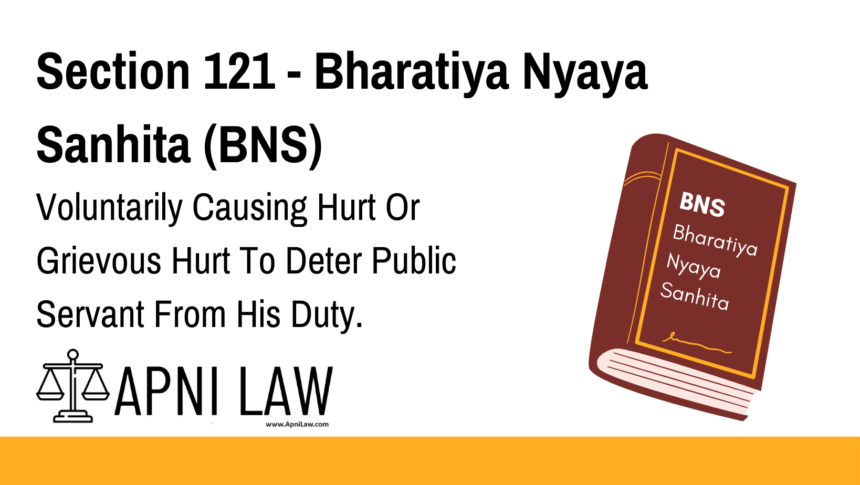Code: Section 121 BNS
(1) Whoever voluntarily causes hurt to any person being a public servant in the
discharge of his duty as such public servant, or with intent to prevent or deter that person or
any other public servant from discharging his duty as such public servant or in consequence
of anything done or attempted to be done by that person in the lawful discharge of his duty
as such public servant, shall be punished with imprisonment of either description for a term
which may extend to five years, or with fine, or with both.
(2) Whoever voluntarily causes grievous hurt to any person being a public servant in
the discharge of his duty as such public servant, or with intent to prevent or deter that
person or any other public servant from discharging his duty as such public servant or in
consequence of anything done or attempted to be done by that person in the lawful discharge
of his duty as such public servant, shall be punished with imprisonment of either description
for a term which shall not be less than one year but which may extend to ten years, and shall
also be liable to fine.
Explanation of Section 121 BNS
Section 121 of the Bharatiya Nyaya Sanhita (BNS) deals with offenses against public servants who are attacked while performing their official duties. This provision ensures the protection of government officials, including police officers, judges, and other civil servants, from acts of violence that may deter them from lawfully executing their responsibilities.
Key Provisions:
- Offense Against Public Servants:
- If a person voluntarily causes hurt to a public servant while performing duty, the punishment can be up to 5 years of imprisonment, fine, or both.
- If the injury caused is grievous hurt, the offender faces a minimum sentence of 1 year, extendable up to 10 years, along with a fine.
- Intent to Obstruct Official Duty:
- The law covers acts where the harm is done intentionally to deter or prevent the public servant from performing their duties.
- Punishment Differentiation:
- Simple hurt results in a lesser penalty compared to grievous hurt, which carries a mandatory minimum imprisonment of 1 year.
Illustrations
Example 1: Attack on a Police Officer
A protester, in an attempt to escape from an arrest, punches a police officer, causing minor injuries. This falls under voluntarily causing hurt and is punishable under Section 121(1) BNS.
Example 2: Severe Assault on a Judge
A person, frustrated with a court verdict, assaults the judge and causes serious injuries. This constitutes voluntarily causing grievous hurt and will attract a minimum punishment of 1 year, extendable up to 10 years, along with a fine, as per Section 121(2) BNS.
Example 3: Attack on a Government Official
A tax officer is attacked by a businessman while conducting a raid. If the officer sustains minor injuries, the offender will face punishment under Section 121(1) BNS. If the injuries are grievous, Section 121(2) BNS applies.
Common Questions and Answers on Section 121 BNS
1. What is the minimum punishment under Section 121 BNS?
- If the offense involves only hurt, there is no minimum punishment—it can be a fine, imprisonment up to 5 years, or both.
- If the offense involves grievous hurt, the minimum punishment is 1 year of imprisonment, which can be extended up to 10 years.
2. Does Section 121 BNS apply to all public servants?
Yes, it applies to all public servants, including police officers, judges, municipal officers, and other government functionaries performing their lawful duties.
3. What constitutes “grievous hurt” under this section?
Grievous hurt is defined in Section 113 BNS and includes injuries such as fractures, loss of vision, permanent disfigurement, etc.
4. Can an accused be granted bail under Section 121 BNS?
- For voluntarily causing hurt (simple hurt), bail is generally allowed.
- For voluntarily causing grievous hurt, bail depends on the severity of the offense and the discretion of the court.
5. How is this different from general offenses of hurt under BNS?
The special aspect of Section 121 BNS is that it applies only when the victim is a public servant performing official duties. Regular cases of hurt or grievous hurt are covered under Section 111 BNS and Section 113 BNS.
Conclusion
Section 121 BNS plays a crucial role in protecting public servants from unlawful attacks. It ensures that any act of violence aimed at obstructing official duties is met with strict punishment, thereby maintaining law and order.
For more detailed legal explanations, visit ApniLaw today! 🚀








